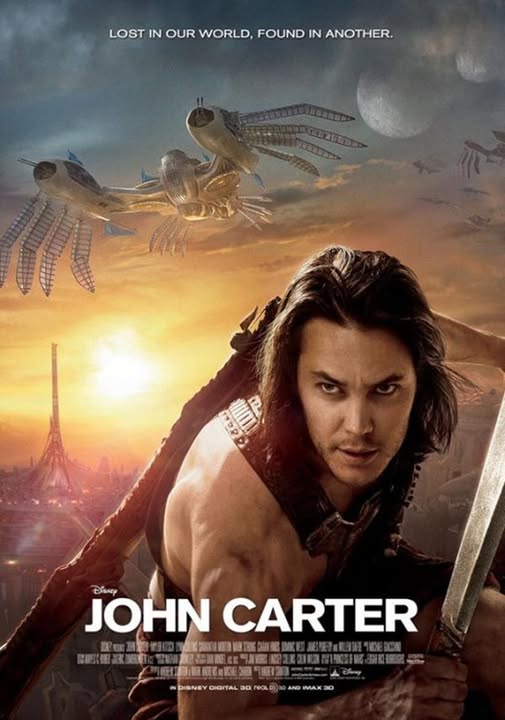🌌 John Carter (2012) – Lost in our world, found in another.

Related movies:
Related movies:
Related movies:
🌌 John Carter (2012) – A Lost Classic of Sci-Fi Cinema
When John Carter hit theaters in 2012, it carried with it the weight of over a century of legacy. Based on Edgar Rice Burroughs’ Barsoom novels, first published in 1912, the film had the ambitious task of adapting one of the earliest works of modern science fiction — stories that had inspired generations of creators, from George Lucas with Star Wars to James Cameron with Avatar. Directed by Andrew Stanton, best known for Pixar’s Finding Nemo and WALL-E, John Carter sought to bring a century-old legend into the modern blockbuster era.
Though its release was marked by controversy over box office returns, the film itself remains a fascinating, visually stunning adventure that continues to attract passionate fans years later.

From Earth to Barsoom – The Story
At its heart, John Carter tells the story of a man adrift between two worlds. Taylor Kitsch plays John Carter, a Confederate soldier left broken by the American Civil War. Disillusioned and weary of violence, Carter seeks only peace — but destiny has other plans. Through mysterious circumstances, he is transported to Mars, known to its inhabitants as Barsoom.
Here, Carter discovers that the planet’s weaker gravity grants him extraordinary strength and agility. What begins as confusion soon becomes opportunity: in this strange new world, he is no longer just a weary soldier but a figure of immense power.
Barsoom itself is in turmoil. Civilizations clash for dominance, from the noble city of Helium to the brutal warlords of Zodanga. Carter finds himself drawn into this conflict when he encounters Princess Dejah Thoris (Lynn Collins), a brilliant and determined leader fighting to save her people. Together, they navigate political intrigue, ancient mysteries, and battles against monstrous foes — all while the looming shadow of destruction threatens the planet.
Through his journey, Carter must confront not only the enemies around him but also the ghosts of his past. Redemption, love, and a new sense of purpose await him on the red sands of Mars.
Casting & Performances
Taylor Kitsch, known for his work in Friday Night Lights, takes on the mantle of John Carter with a mix of rugged charm and quiet vulnerability. His performance captures the essence of a man caught between resignation and rebirth — a soldier who has lost everything but finds new meaning in an alien world.
Opposite him, Lynn Collins shines as Princess Dejah Thoris. Unlike the stereotypical “damsel in distress,” Dejah is portrayed as a scientist, warrior, and political figure — a woman of strength and intelligence whose fate intertwines with Carter’s. Collins’ commanding performance brings heart and depth to the role, making Dejah one of the most compelling elements of the film.
The supporting cast is equally impressive. Mark Strong lends his trademark gravitas to the role of Matai Shang, a mysterious manipulator behind Barsoom’s conflicts. Willem Dafoe, through motion capture, brings life to Tars Tarkas, the noble Thark warrior who becomes both ally and friend to Carter. Together, the ensemble delivers performances that ground the fantastical setting in human emotion and dramatic weight.

A Director’s Leap of Faith
For director Andrew Stanton, John Carter was a bold leap from animation to live-action. Having proven his storytelling genius with Finding Nemo and WALL-E, Stanton sought to blend his mastery of character-driven narratives with epic science fiction spectacle.
Visually, the film is a marvel. The Martian landscapes are brought to life with sweeping desert vistas, colossal airships, and towering alien cities. The design of the Tharks, Barsoom’s green-skinned, four-armed warriors, is a triumph of digital artistry and motion capture performance. The battles, both on the ground and in the skies, combine old-fashioned swashbuckling adventure with cutting-edge effects.
Despite the film’s ambition, its production challenges and marketing missteps hindered its success. Many critics noted the difficulty of adapting such a foundational work, one that had already influenced countless other films, leading some to view John Carter as derivative — even though the reverse was true.
Themes of Redemption & Identity
Beyond the spectacle, John Carter resonates on a thematic level. At its core, it is a story of redemption. Carter begins as a man without purpose, broken by war and personal loss. On Mars, he finds not only extraordinary power but also the chance to fight for something greater than himself.
The film also explores identity and belonging. Carter, a stranger on Barsoom, must learn to navigate its cultures and earn the trust of its people. His journey mirrors that of many classic heroes — a reluctant savior who grows into the role he once resisted.
Love, too, plays a central role. Carter’s relationship with Dejah Thoris is not only romantic but symbolic: through her, he finds connection, hope, and a future he thought lost forever.

A Legacy Misunderstood
Upon release, John Carter was met with mixed reviews and underwhelming box office numbers. Marketed simply as “John Carter” — a title stripped of the evocative “of Mars” — the film struggled to find its audience. Disney’s marketing campaign, criticized for failing to communicate the story’s grandeur, left many potential viewers confused about what the film was actually about.
Yet over the years, John Carter has gained a reputation as an underrated gem. Fans praise its sincerity, its world-building, and its commitment to Burroughs’ vision. For many, it represents a kind of old-fashioned adventure rarely seen in the age of modern blockbusters — earnest, romantic, and filled with imagination.
Why John Carter Still Matters
In retrospect, John Carter stands as both a cautionary tale and a reminder of cinema’s ambition. It showed how risky it can be to adapt a beloved but long-dormant property, yet it also demonstrated the power of storytelling that reaches across generations.
For viewers today, the film offers an experience that blends pulp adventure with heartfelt drama. It is a reminder that heroes are not defined by where they come from but by the choices they make. And for John Carter, a soldier with no cause, Mars offered not only a battlefield but also a home — and a destiny.










